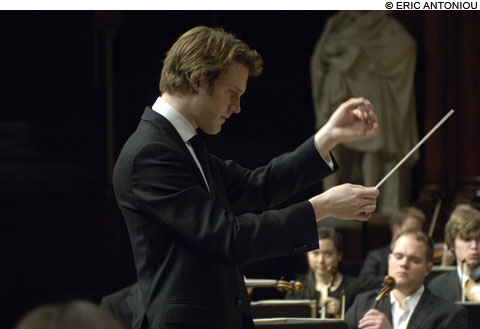
BRAVO! The Discovery Ensemble’s concert of Britten, Martin, and Beethoven continued to make the case that this group deserves a larger audience. |
Next day, one of my favorite groups had its first concert of the season: the Discovery Ensemble led by the charismatic 26-year-old Belfast-born Courtney Lewis. Good things have been happening to DE members. Last year Lewis was appointed assistant conductor of the Minneapolis Orchestra; this year he's been promoted to associate conductor, and was also appointed a Dudamel Fellow with the LA Philharmonic, working with Gustavo Dudamel and the students in the LA Phil's educational program. Meanwhile DE concertmaster Joshua Weilerstein, barely two years into his career as a conductor, has been appointed one of the two assistant conductors of the New York Philharmonic. These two brilliant young musicians, both dedicated to bringing classical music to young people who've never been exposed to it, are just the tip of the iceberg when it comes to this impressive group, which has everything going for it. But even with outstanding concerts, great reviews, and a passionate following, the size of the Discovery Ensemble audiences at Sanders Theatre remains small. It's a mystery.
The opening program was typically imaginative, beginning with a dazzling performance of the 25-year-old Benjamin Britten's two-and-a-half week wonder, Variations on a Theme of Frank Bridge (1938). Bridge was Britten's teacher, and the theme was from his 1901 Idyll for String Quartet, and though Britten sets the theme itself as a ghostly string quartet, he brings Bridge further — much further — into the 20th century. There's a pizzicato march, a buffo Rossini-esque "Aria Italiana," an intense funeral march with a slow tread in cellos and basses, a comic cobweb-delicate fugue, and an otherworldly Mahlerian finale. A friend in the audience called Britten's piece "smarty-pants." The performance took it well beyond that.
The next piece was an even greater rarity: the Swiss composer Frank Martin's Six Monologues from "Jedermann"(1943), settings of passages from Hugo von Hofmannsthal's play Everyman (written in 1911 and performed at the opening of every Salzburg Festival since 1920). These are grim, brooding pieces for baritone (famously performed by Dietrich Fischer-Dieskau and locally by Sanford Sylvan), this time with the rich-voiced American baritone Christòpheren Nomura, singing with a new intensity and expressivity. These "monologues" are poems about facing and traveling with Death (with a capital D), seductively orchestrated for solemn brasses with bassoon lamentations, beginning in fear and ending with the orchestra sounding like a church organ as Everyman finally sees the celestial light.
Then what piece better to shake off this dark mood than Beethoven's Seventh Symphony, in an exhilarating performance. Here, for a change, partly because Lewis divided the violin sections antiphonally, we could hear every detail of Beethoven's orchestral dialogue, even during the most breathless race forward. In the first movement, flickers of woodwind lightning were like the calm before the storm. The ostinato second-movement march — part funeral march — was a true Allegretto, with a restrained steady pace, and a sense of leaving us behind as the marchers disappeared into the distance. In the last movement, Allegro con brio, Lewis's strong beat was like a hedge with galloping horses leaping over.